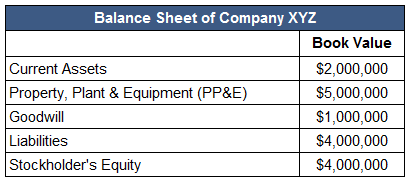What Is Goodwill?
Goodwill is the excess of purchase price over the fair market value of a company's identifiable assets and liabilities. Goodwill is an accounting construct that is required under Generally Accepted Accounting Principles (GAAP).
How Does Goodwill Work?
Goodwill occurs when one company acquires another for a price higher than the fair market value of its assets.
For example, Company ABC may purchase Company XYZ for more than the fair value of its assets and debts. The amount remaining would be listed on Company ABC's balance sheet as goodwill.
Where Is Goodwill on the Balance Sheet?
Goodwill is located in the assets section of a company’s balance sheet. Unlike physical assets (like buildings and equipment), goodwill is considered an intangible asset.
Purchased Goodwill Example
Assume that Company ABC wants to acquire Company XYZ. ABC purchases all of the outstanding stock of XYZ for $8,000,000. On the acquisition date, Company XYZ lists the following assets and liabilities:

Breaking Down this Example of Goodwill
An appraisal estimates the fair market value (FMV) of the PP&E at $7 million. The book value of all the other assets and liabilities is equal to FMV.
The fair value of XYZ's assets and liabilities is $2,000,000 + $7,000,000 - $4,000,000 = $5,000,000. We leave out the goodwill listed on XYZ's balance sheet because it's not a real asset purchased by ABC. Instead, it's an accounting construct that XYZ is required to list before its acquisition.
Company ABC paid $8,000,000 for the stock, so on its next balance sheet, Company ABC will list an account called “goodwill” that will have a value of $3,000,000.
Remember: Stock Is Often Worth More Than Assets
The stock of many well-known companies is worth more than the value of their assets. To cite notable examples, the majority of Coca-Cola's share value is not in its brick-and-mortar bottling plants, but instead in the brand name and 'secret formula' of its storied soft drink brand.
Why Does Goodwill Matter to a Company?
The appropriate value of goodwill can be extremely hard to define. Though goodwill is listed as an asset, it can't be bought or sold. When examining a firm’s assets, many analysts prefer not to consider it, opting for 'tangible book value” (which excludes non-cash balance sheet items like goodwill and amortization).
Company ABC may pay too much to acquire Company XYZ. If the acquired net assets fall in value, Company ABC must write them down using a process called 'impairment'. Impairment charges flow to the income statement and will negatively affect earnings per share and the firm's stock price.



